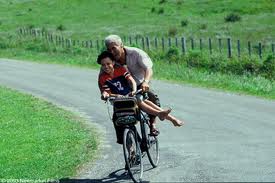"My name is Paikea Apirana, and I come from a long line of chiefs stretching all the way back to the Whale Rider. I'm not a prophet, but I know that our people will keep going forward, all together, with all of our strength."
 This is the last line of "Whale Rider" before it ends. Paikea as a Maori girl from the tribe of the Whale Rider, struggles in living out her calling as a leader in a patriarchal society, where males such as fathers or authorities with father-figures have the power and structural control over legal, economic, political as well as religious institutions (Glick & Fiske, 1997). Most of the time, the titles and the property are inherited by the male lineage (Glick & Fiske, 1997). As a eldest son, Paikea's father refused to carry the traditional leadership and he left Paikea to his father, went to other country and be what he is passionate for. As a Chinese saying: blood is thicker than water, although from the born of Paikea and the death of twins brother, the grandfather did not like her at the beginning as he is waiting for a male leader from his family to be raised as a leader, but the affectionate bond is still developed after years of being together with this granddaughter.
This is the last line of "Whale Rider" before it ends. Paikea as a Maori girl from the tribe of the Whale Rider, struggles in living out her calling as a leader in a patriarchal society, where males such as fathers or authorities with father-figures have the power and structural control over legal, economic, political as well as religious institutions (Glick & Fiske, 1997). Most of the time, the titles and the property are inherited by the male lineage (Glick & Fiske, 1997). As a eldest son, Paikea's father refused to carry the traditional leadership and he left Paikea to his father, went to other country and be what he is passionate for. As a Chinese saying: blood is thicker than water, although from the born of Paikea and the death of twins brother, the grandfather did not like her at the beginning as he is waiting for a male leader from his family to be raised as a leader, but the affectionate bond is still developed after years of being together with this granddaughter.
As Paikea wants to live the calling as a leader and she is qualified to be the leader, but it always turn down by her grandfather simply because the leadership was reserved to males and she is a girl. The sexism occurs here showed a type of prejudice and bias about one gender is being superior than another gender, which may also lead to discrimination (Myers, 2010). The grandfather forbids Paikea from learning Taiaha and stepping into the cultural school shows the discrimination. Another interesting fact found in the film was even the second child is a male, he is still not a candidate to be chosen as a leader simply because the birth order, as the leader is supposed to be chosen from the eldest son. Uncle Rawiri, Paikea's uncle, the second son in the family was good in playing Taiaha and wanted to take over the leadership that his elder brother aborted, but the father turned down this heart of willingness too. This poor little girl striving hard to prove herself until she almost pays her life up, and finally her grandfather puts away the stubbornness and stagnation to declare Paikea's leadership.
I feel lucky enough for never experience such prejudice and discrimination from my family, however sometimes I feel overwhelmed due to the attention that focuses on me. My father is the eldest son in the family and I have one uncle who does not married. I am the only daughter of my father, therefore the only grandchild who carries the family name. Most of the time, my father would put the pressure on me emphasizing that "because you are the Lee's (family name)" therefore I should behave in certain ways. He does not emphasize this on my achievements but he values the traditions such as must be home during important festivals. If I happened to have other plans on the important festival, he might get mad on me. Furthermore, I tend to achieve higher standards in my life because I have this sense of "I am the hope of the Lee's". Although it brings burden and more responsibilities to the status and identity, but it is definitely my blessing and honor to be superior in my family.
References
Glick, P., & Fiske, S. T. (1997). Hostile and benevolent sexism measuring ambivalent sexist attitudes toward women. Psychology of Women Quarterly,21(1), 119-135. doi:10.1111/j.1471-6402.1997.tb00104.x
Myers, D. G. (2010). Social Psychology (11th ed.). United States, US: McGraw
Hill.
Pictures from Google
https://www.google.com/search?q=whale+rider+bicycle&espv=2&biw=1366&bih=623&site=webhp&source=lnms&tbm=isch&sa=X&ved=0ahUKEwjnzovEkLLLAhXQBo4KHdqqAg0Q_AUIBigB#imgrc=Zy4hE_MQb07bYM%3A
No comments:
Post a Comment